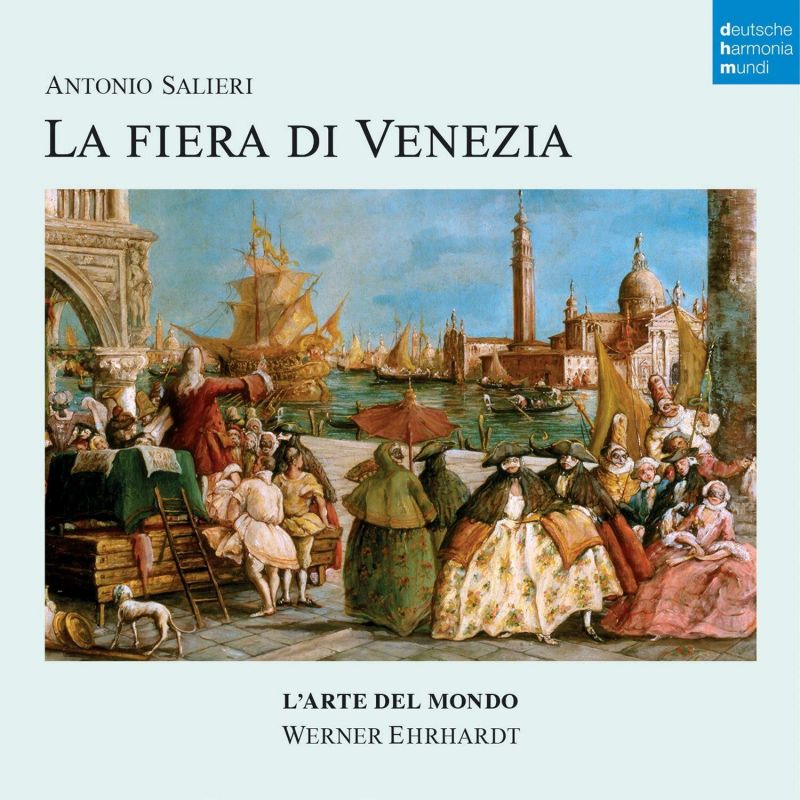SALIERI La fiera di Venezia (Ehrhardt)
View record and artist detailsRecord and Artist Details
Composer or Director: Antonio Salieri
Genre:
Opera
Label: Deutsche Harmonia Mundi
Magazine Review Date: 11/2019
Media Format: CD or Download
Media Runtime: 143
Mastering:
DDD
Catalogue Number: 19075 96456-2

Tracks:
| Composition | Artist Credit |
|---|---|
| (La) Fiera di Venezia |
Antonio Salieri, Composer
(L') Arte del Mondo Antonio Salieri, Composer Dilyara Idrisova, Calloandra, Soprano Emanuele D’Aguanno, Rasoio, Tenor Francesca Lombardi Mazzulli, Falsirena, Soprano Furio Zanasi, Grifagno, Baritone Giorgio Caoduro, Belfusto, Baritone Krystian Adam, Ostrogoto, Tenor Natalia Rubiś, Cristallina, Soprano Werner Ehrhardt, Composer |
Author: Richard Lawrence
Much of the action hangs on the characters being masked, or otherwise disguised. Falsirena turns up as an opera singer, a French saleswoman and a German baroness. As well as causing confusion to the aristocratic couple, this gives Salieri the opportunity for parody: ‘Aci, ben mio’ is a pastoral duet for Acis and Galatea, ‘Rabbia, bile, affanno’ is a ‘rage’ aria, while the terzetto in the next act is a German dance. Later on, the libretto pokes gentle fun at the conventions of opera seria when Ostrogoto compares himself to a helmsman who forgets the storm when he sees his reflection in the tranquil sea.
Salieri sets the scene with the bustling traders in the Piazza, before the story gets going. The music made a keen impression on Mozart. He wrote a set of variations on ‘Mio caro Adone’ from Act 2 (K173c); more significantly, in Belfusto’s arias, especially ‘Oh donne, donne, a diverla’, we can hear an anticipation of Guglielmo’s ‘Donne mie, la fate a tanti’ in Così fan tutte. And I would guess that Calloandra’s ‘Vi sono sposa’, with its flute and oboe obbligatos, is an even more likely inspiration for Konstanze’s ‘Martern aller Arten’ in Die Entführung than another possible candidate, an aria from JC Bach’s La clemenza di Scipione (London, 1778).
Salieri’s coloratura aria, in Mozart’s C major and complete with cadenza, is admirably sung by Dilyara Idrisova. It’s a serious piece, and not the only one. ‘Il pargoletto amabile’ is a lyrical number addressed to Falsirena by Ostrogoto, which Krystian Adam sings with great tenderness. The live recording is based on a stage production at the Schwetzingen Festival: the sopranos sometimes sound shrill and the horns can be over-prominent, but this is not too serious. There is, however, one drawback. The recitatives are ruined by the antics of the fortepiano player, whose scales, arpeggios and general hyperactivity suggest that he has been listening to Teodor Currentzis’s recordings of the Mozart/da Ponte comedies – not a good model. Even worse, he indulges in jokey, anachronistic references: I noted the Marseillaise, Haydn’s Austrian national anthem, Für Elise and the Brindisi from La traviata; no doubt there are others. Fortunately, you can program the recitatives out, and I strongly advise you to do so. Otherwise, the 21-year-old composer (over 30 operas were to follow) is well served by Werner Ehrhardt and L’Arte del Mondo.
Discover the world's largest classical music catalogue with Presto Music.

Gramophone Digital Club
- Digital Edition
- Digital Archive
- Reviews Database
- Full website access
From £8.75 / month
Subscribe
Gramophone Full Club
- Print Edition
- Digital Edition
- Digital Archive
- Reviews Database
- Full website access
From £11.00 / month
Subscribe
If you are a library, university or other organisation that would be interested in an institutional subscription to Gramophone please click here for further information.




